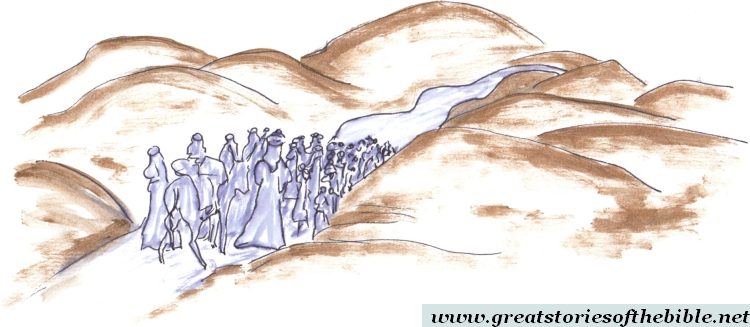Isaiah - episode 5
Comfort my people
Scholars generally recognize in Isaiah a division into three main sections. The First Isaiah (chapters 1-39) is attributed to Isaiah the son of Amoz, who carried out his ministry in the kingdom of Judah in the VIII century BC. The Second Isaiah (chapters 40-55) is anonymous: maybe he was a First Isaiah’s spiritual disciple, who lived at the time of the Babylonian exile (VI century BC). The Third Isaiah (chapters 56-66) is anonymous too: the topics he covers suggest a dating back to the edict of Cyrus (539 BC), with the various returns home of the exiles. For more information on the historical situation of the Hebrew people in those times, you can read the posts about King Josiah (episode 1 and episode 2) and about Ezra and Nehemiah.
In the last posts we read several passages belonging to the First Isaiah, concise and sober in style, where the dominant foreign power is Assyria. In 721 BC Assyrians destroyed the kingdom of Israel in the north, deporting its inhabitants, and they threatened the kingdom of Judah in the south, levying a heavy tribute. The Second Isaiah, with intensity and passion, speaks instead to the exiles of Judah who were deported by the Babylonians and he urges them not to lose hope and faith in the Lord. «“Comfort, comfort my people,” says your God. “Speak tenderly to Jerusalem; and call out to her that her warfare is accomplished, that her iniquity is pardoned, that she has received of the LORD’s hand double for all her sins.” The voice of one who calls out, “Prepare the way of the LORD in the wilderness! Make a level highway in the desert for our God. Every valley shall be exalted, and every mountain and hill shall be made low. The uneven shall be made level, and the rough places a plain. The glory of the LORD shall be revealed, and all flesh shall see the salvation of God; for the mouth of the LORD has spoken it.” The voice of one saying, “Cry!” One said, “What shall I cry?” “All flesh is like grass, and all its glory is like the flower of the field. The grass withers, the flower fades, because the LORD’s breath blows on it. Surely the people are like grass. The grass withers, the flower fades; but the word of the LORD stands forever.” You who tell good news to Zion, go up on a high mountain. You who tell good news to Jerusalem, lift up your voice with strength. Lift it up. Do not be afraid. Say to the cities of Judah, “Behold, your God!”» (Isa 40,1-9). «Why do you say, Jacob, and speak, Israel, “My way is hidden from the LORD, and the justice due me is disregarded by my God?” Haven’t you known? Haven’t you heard? The everlasting God, the LORD, The Creator of the ends of the earth, doesn’t faint. He isn’t weary. His understanding is unsearchable. He gives power to the weak. He increases the strength of him who has no might. Even the youths faint and get weary, and the young men utterly fall; But those who wait for the LORD will renew their strength. They will mount up with wings like eagles. They will run, and not be weary. They will walk, and not faint» (Isa 40,27-31). The prophet is a true “evangelist” (a messenger who brings good news), who heartens the disheartened Israel. He invites them to undertake a new Exodus, led by the Lord’s power as was in the ancient times (see Exod 19,4: «on eagles’ wings»). It will be a journey of liberation and return home through a wilderness that the Lord will make flower (see for example Isa 41,17-20 and Isa 43,18-19). This will happen because the Lord is the «Redeemer» (Isa 41,14): for the Hebrew laws of the time the person who can redeem from bondage, because of a blood relationship or a Covenant.
The Lord of history arouses Cyrus, the great Persian leader, against the Babylonians who exiled His people: «Thus says the LORD to his anointed, to Cyrus, whose right hand I have held, to subdue nations before him, and strip kings of their armor; to open the doors before him, and the gates shall not be shut: [...] For Jacob my servant’s sake, and Israel my chosen, I have called you by your name. I have surnamed you, though you have not known me. I am the LORD, and there is no other. Besides me, there is no God. I will strengthen you, though you have not known me; that they may know from the rising of the sun, and from the west, that there is none besides me. I am the LORD, and there is no one else. I form the light, and create darkness. I make peace, and create calamity. I am the LORD, who does all these things. Distil, you heavens, from above, and let the skies pour down righteousness. Let the earth open, that it may bring forth salvation, and let it cause righteousness to spring up with it. I, the LORD, have created it» (Isa 45,1.4-8; see Isa 41,2). East and west, light and darkness, peace and calamity, heaven and earth: Israel has a single almighty God to trust in, rejecting all idols. «“You are my witnesses,” says the LORD, “With my servant whom I have chosen; that you may know and believe me, and understand that I am he. Before me there was no God formed, neither will there be after me. I myself am the LORD; and besides me there is no savior» (Isa 43,10-11).
A new Exodus needs a new mediator: he is the mysterious Servant who we will meet in the next post.